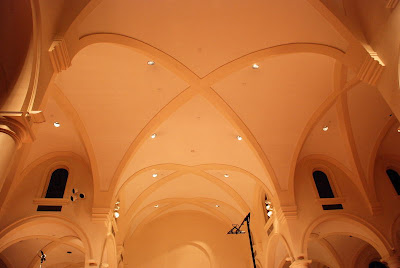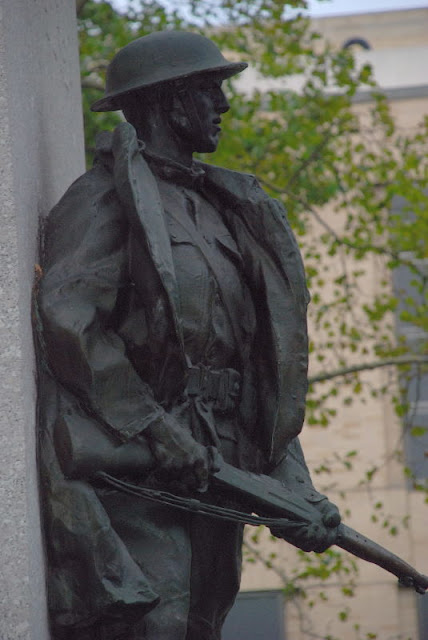 |
| Allies Day, May 1917 is an oil-on-canvas by American artist Childe Hassam from 1917. It is said to be the most famous of his ‘flag paintings,’ and it captures a scene on Fifth Avenue, not far from his studio. |
If you remember the game show Concentration, you may appreciate pattern recognition skills. This edition of The Magpie Mason is inspired by a match made of mind in me while reading a book of Grand Lodge proceedings and recollecting the painting above.
On this date, and at this very hour, in 1917, the Grand Lodge of New York opened its 136th Annual Communication inside the Grand Lodge Room of Masonic Hall, off Fifth Avenue.
Among the orators that day were Bro. Theodore Roosevelt, former President of the United States—whose remarks deserve their own Magpie post—and a Brother Mason visiting from Canada.
Less than a month earlier, the U.S. Congress declared war on Germany, bringing America into what we today term World War I.
The Canadian visitor was The Hon. William Renwick Ridell, Chief Justice of the Supreme Court of Ontario. With his nation being integral to the British Empire, and having deployed an enormous number of troops—disproportionate to its population, in fact—to France and Flanders, Ridell could not have neglected to discuss the war that day. The comforting notion of Freemasonry transcending nationalities to cement a Brotherhood of Man has its practical limits, you understand.
I can’t reproduce Ridell’s complete remarks here, so I’ll zero in on what prompted my memory of Childe Hassam’s Impressionist painting Allies Day, May 1917.
Most Worshipful Sir and Brother Masons: I was prepared this afternoon to make a set speech. I prepared myself with manuscript and notes. I threw them away after the reception which I have received from you, my brethren of the United States, and I shall speak to you as a brother—as an American, if you will, because I was born on the Continent of North America, and a Briton as I am to my fingertips, and Canadian to the last drop of my blood, I claim the privilege and the heritage which Americans have wrought out for Canadians and Americans and Britons together. ...
But our Masonry as we know it, our Speculative Masonry as we know it, the Ancient Free and Accepted Masonry as we know it—it was organized and placed in systematic form and made eternal by the work of the English Masons who had drunk deep of that which characterized the Masons and that which characterized the Englishmen, that which characterizes all those who have received even a part of their institutions from old England: liberty.
Let it not be forgotten, Oh you Americans, proud of your own United States and of your Declaration of Independence—let it not be forgotten that the Declaration of Independence is the last outcome of the long struggle for liberty which took place in the little island from the time of the Dark Ages—because the English could never willingly bow the knee to the tyrant, and he was the only man throughout the ages—and I am not even excepting my own ancestors of Scotland—the only man throughout the ages who never yet bowed the knee to a tyrant. That freedom which characterizes English Freemasonry characterizes our own Freemasonry. When we are told that when English Freemasonry was introduced into France and Germany that which characterized it most was its brotherhood, we begin to appreciate the significance of our brotherhood. It was Masonry’s brotherhood which attracted the attention of the Frenchmen and which attracted the attention of the Germans, and it was its brotherhood which was the great theme throughout all these lodges which had their origin, which spring out from the great mother across the sea. ...
This is a Masonic war. This is a war for that which Masonry has always stood, for which Masons stand, for which Masonry must always stand, unless it denieth itself and sells itself for a mess of pottage. This is a war for the brotherhood of the world. This is a war for that which is the finest characterization in public life of the democracy of the Masonic life, of the brotherhood of the Masonic Lodge: democracy. ...
Masonry is democracy; true Masonry is democracy. There are no grades in Masonry. The degrees in Masonry are open to all honest men alike. Those there are indeed in authority over us, but those are elected by the free vote of their fellow Masons. There is no King or Kaiser or Czar born to govern and born to rule. Masonry is in itself democracy, and it is for that reason that this war should appeal to all Masons. ...
Coming down Fifth Avenue today I saw a sight that made my heart leap for joy: The Stars and Stripes, Old Glory, hanging in the center, flanked by the Tricolor of France and the blood red banner of England. That is the place for the American flag. It is the place for the American flag to be in advance of both those flags and between them. There was the American Revolution, sir, which was the origin and spur for the French Revolution, and it was that thin line of farmers which stood embattled on Bunker Hill, owing little to the recruiting officers and none to the drill sergeants, but everything to their own strong hearts and determination to be free, it was that thin line of farmers standing on Bunker Hill which forced democracy, which was nearly dead in England, which forced democracy to the front. ... If the United States spends their last man and last dollar, it is their intention that the very soul of Masonry shall not die from off the face of the earth.
Childe Hassam (1859-1935) studied in Paris in the late 1880s. While he is considered an Impressionist, and does employ those techniques here, he also uses an architectural precision that you can see in the many clear lines that shape the pieces in the composition.
It was the June 29, 2020 post of the great Ephemeral New York blog that introduced me to this artist and this painting. I find this image so gripping I remembered it immediately upon reading Ridell’s description of the scene.











































































